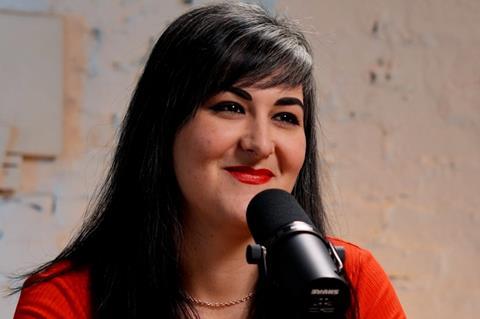The former video editor of the ‘Triggernometry’ podcast Sophie Spital says being a Christian has provided her with clarity and freedom in accepting her God-given identity, despite the challenges of gender dysphoria

The Church hasn’t always had the best reputation when it comes to engaging with the LGBT community. Sophie Spital believes the answer is found in determining to share the truth with love. As someone who has experienced gender dysphoria herself, she is well-equipped to do this.
Sophie’s most public conversation around gender dysphoria to date has been on the popular podcast, ‘Triggernometry’ which, at the time, she also happened to be the video editor of.
Hosted by comedians Konstantin Kisin and Francis Foster, ‘Triggernometry’ has grown to attract some huge guests, including Piers Morgan and most recently, the Israeli Prime Minister, Benjamin Netanyahu. Although not a Christian podcast, many of Trigger’s 1.5m subscribers are interested in and open to matters of faith, and the host’s conservative stances sometimes overlap with traditional Christian views around the contentious ethical issues of our time.
Having a Christian like Sophie not only working behind the scenes of the podcast (she was the first person ‘Triggernometry’ ever hired) but also being interviewed on the show, gave her the perfect opportunity to shine a light on gender dysphoria from what she believes is a biblical perspective.
Living in Brighton - a city well known for its LGBT community - the 35 year-old has continued to boldly speak out about both her experience with gender dysphoria and how her Christian faith has helped her. In this interview, Sophie delves deeper into who she is, the God she has found to be good and her passion for helping others experiencing gender dysphoria to encounter God’s love for themselves.
Tell me about life growing up and how you became a Christian.
I was raised in a Christian family, although my dad’s side of the family is all Orthodox Jews, so I had Jewish influence there.
Because I’m autistic, I see things in a very cerebral way. So I found my faith through apologetics. I couldn’t trust [Christianity] unless I knew it was reliable. So I looked at the science, history, archaeology, and philosophical arguments. Then I was convinced that [Christianity] was the truth.
Wanting to be a different sex, ultimately, is the sin of coveting something that, by definition, cannot be yours
Since then, I’ve been slowly allowing myself to enjoy the emotional benefits of it. Through my personal story of where I’ve come to with my gender and my autism, I found God to be very much there and good in those things, even though it’s exactly the opposite of what the worldly narrative is at the moment.
How did you get involved in Triggernometry?
I’m from Chelmsford, Essex, but I came to Sussex to study media, and stayed because I fell in love with the church here.
Then, I was able to use the gifts that God had given me in video production, working on podcasts, and got involved in working for ‘Triggernometry’ because I wanted to have an impact on spreading Christian ideas in the public sphere. It’s not a Christian podcast, but at the same time, I think there was a lot of emphasis on some of the things I cared about, particularly to do with gender and sex.
When did your experience of gender dysphoria start?
I can’t remember a time before it, because I always assumed I was a boy, and I had to keep being reminded that I wasn’t.
I kept experiencing these pangs of realisation that I wasn’t male. That took a long while to work through based on understanding I was autistic, because when I understood the autism, I realised that I wasn’t a man, I was a rarer type of woman.
Do you still experience gender dysphoria now?
I would say that there are two kinds of gender dysphoria. There’s thinking you’re the opposite sex and there’s wanting to be.
I sometimes experience the pangs of [thinking]: Life would be so much easier if I were a man. For example, if a group of male friends are going out for a drink or to do something fun, I know they’re just going to have a laugh, and come away from it not knowing anything about the person’s personal problems. I’d much rather be doing that than going for drinks with women, talking about their relationships and problems. That might sound trivial, but that kind of envy is the bedrock of the majority of gender dysphoria we see in young women nowadays.
Most people identifying as trans or non binary now are girls who never experienced childhood gender dysphoria. When they reach adolescence, and the pressure of expectations of what it means to be a woman start hitting, there’s a real hatred of womanhood - and a fear of all the things that get thrust upon them. For example, being seen first for how attractive you are, rather than how competent you are - these are added burdens that come with womanhood. So if you identify as trans or non binary, you may be signaling: “I’m not going to join in with these expectations.” From what I’ve observed, the majority of girls who are experiencing gender dysphoria at the moment are in that second category. It’s not that they want to be men, but they don’t want to be women.
Every person, whether straight, gay or struggling with gender dysphoria, has to come into alignment with what God says is good for them
However, the good thing is that it’s treatable. So if a teenage girl is going to counselling because she’s struggling with her gender, you can work that thing through. The talking therapy route used to be the gold standard for treating people with gender dysphoria: it’s talking through expectations, what you’ve learned from your peers and your family about what it means to be a man or woman - [and] all those fears can be alleviated.
When I understood my autism, the sense of defaulting to thinking I was male went away - praise God. But yes, one still has to contend with these things that come up every now and then. I probably still experience envy or resentment. I just have to take that thought captive. There are difficult things about being a woman, and there are difficult things about being a man. And I’m just going to say: “God, you are good enough for the portion you’ve given me.”
How has your church helped you through your experience of gender dysphoria?
Emmanuel in Brighton, which is my church, has been excellent. And they have done what many churches haven’t.
I see a few different ways that churches might deal with gender dysphoria, and one of them is affirming churches. If someone comes in and says: “I’m born in the wrong body”, or: “I’m trans”, it might feel like the loving thing to do is to affirm that. But actually, it’s a very unhelpful thing to do, because what you’re doing is reinforcing a lie that the person is believing about themselves.
I realised a lot of the shame I had about the gender dysphoria was about the fact that I didn’t match up with the expectations of femininity, a lot of which was based on stereotypes. So to reinforce that idea is unkind. I know that if gendered ideology had been around when I was a teenager, I would have been demanding to be called “he”, “him” and a male name. I would have identified as trans, but for the grace of God. If someone had thought they were being loving and referred to me by male pronouns and a male name, it would have been the worst thing they could have done to pastor me well.
I think it’s dangerous to join in with affirming these ideas that there’s a particular right or wrong way to be a male or a female. We need to celebrate the diversity that God has put within the sexes, rather than [reduce] it to stereotypes.
So that affirming approach is wrong. The second way is much better, which is to treat it like it is a mental health condition - which is what gender dysphoria has always been seen as. It should be treated like an eating disorder or body dysmorphia disorder, where the person believes things about themselves that are not true. So it’s pastoring them through this. But even better - and what Emmanuel did for me - is to look at the sin beneath some of it. Wanting to be a different sex, ultimately, is the sin of coveting. Coveting is to want something that, by definition, cannot be yours. God has given it to another, and what he has ordained for you is not to have those things. To address the sin underneath is what sets people free.
Although I was treated with great compassion and grace at Emmanuel, they also did not shy away from exploring the beliefs that undergird this, which are not in alignment with the truth of what God says.
What does the Bible say about being a woman?
If you look to the Bible to work out what it means to be a man or woman, you’ll find that it’s much more concerned with what it means to follow God. I found that being a woman is just something that you are. It’s like saying: “What does it mean to have blue eyes?” You just are, and then you live your life.
There are two kinds of gender dysphoria. There’s thinking you’re the opposite sex and there’s wanting to be
Proverbs 31, when it talks about an ideal wife, centres on godliness. And it even says beauty is vain, that it’s not the most important thing. It talks about being strong, charitable and creative. I’ve found the biblical understanding of what a woman is to be much better than what the world offers.
Is it possible to be a Christian and trans identifying?
Of course it’s possible to be a Christian and have gender dysphoria and struggle with confusion about gender.
But when it comes to deciding to adopt a trans identity or trying to transition, I would say that is a sin and a refusal to come into the truth of who God has made you to be. While we can be very compassionate and pastoral with people, we need to be honest. Every person, whether they are straight, gay or struggling with gender dysphoria, has to come into alignment with what God says is good and right for them, and that requires sacrifice and realignment of our thinking.
The reality is that everything God has for us is good. It’s not just about [gender transitioning] being wrong. You will find freedom, joy and peace in accepting what God has given you.
What are your words of encouragement to Christians on loving people experiencing gender dysphoria well?
You can’t have love without truth, and you can’t have truth without love. Ultimately, the most loving thing you can do for a person is speak the truth, no matter how difficult it is.




































